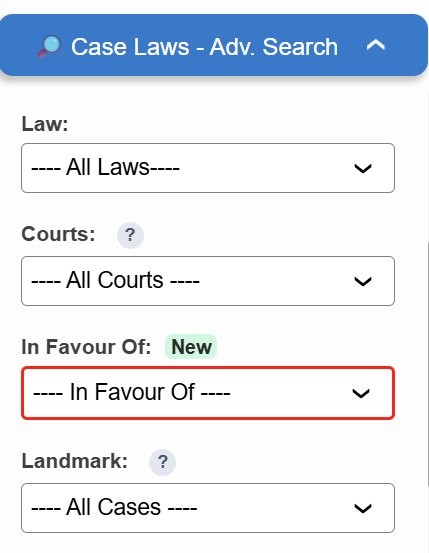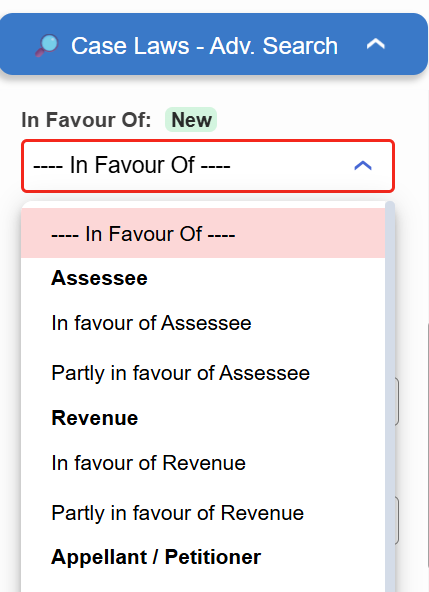Introducing the “In Favour Of” filter in Case Laws.
- ⚖️ Instantly identify judgments decided in favour of the Assessee, Revenue, or Appellant
- 🔍 Narrow down results with higher precision
Try it now in Case Laws →


Just a moment...
Introducing the “In Favour Of” filter in Case Laws.
Try it now in Case Laws →


Press 'Enter' to add multiple search terms. Rules for Better Search
No Folders have been created
Are you sure you want to delete "My most important" ?
NOTE:
Don't have an account? Register Here
<h1>Upheld refusal to interfere where taxpayer failed to prove assessing officer was duly authorized under section 124(3)</h1> HC upheld the ITAT decision, refusing to interfere with the assessment because the taxpayer failed to produce the authorization showing the Addl. CIT, ... Transfer of jurisdiction u/s 127 - Jurisdiction of an AO in case of non-compliance and/or after the period stipulated in clauses (a) and (b) - HELD THAT:- As the provisions of Section 124(3) of the Act and the questions surrounding that provision would have warranted further consideration, provided the appellant had been able to establish that the Addl. CIT Range-23, New Delhi was duly empowered to act as the AO. We note from the judgment rendered by the ITAT that the Addl. CIT Range-23 New Delhi is stated to have been assigned to be the AO by virtue of an order of the CIT dated 09 December 2013. ITAT however has noted that despite opportunity having been granted, the appellant had failed to place that authorisation for its perusal. It is the aforesaid aspect which has constrained the ITAT to observe that the mere mentioning of such an order in the assessment order which was framed would not suffice. No ground to interfere with the views expressed by the ITAT. ISSUES PRESENTED AND CONSIDERED 1. Whether non-raising of jurisdictional objection by an assessee in terms of Section 124(3) of the Income Tax Act bars challenge to the Assessing Officer's jurisdiction and precludes a finding of illegality or voidness of the assessment order. 2. Whether an assessment order is illegal or void ab initio where the Assessing Officer purportedly assumed jurisdiction after transfer of the case without a produced or placed-on-record order of transfer/constitution under Section 120 (or related delegatory/assignment order) demonstrating empowerment of the officer to act. 3. Whether the Income Tax Appellate Tribunal was obliged to apply and follow relevant jurisdictional High Court decisions relied upon by the Revenue when determining the validity of the AO's jurisdiction and the consequence of non-compliance with statutory requirement(s) for challenging jurisdiction. ISSUE-WISE DETAILED ANALYSIS Issue 1 - Effect of Section 124(3) (non-raising of jurisdictional objection) on challenge to AO's jurisdiction Legal framework: Section 124(3) of the Income Tax Act prescribes the manner and time within which a person may call in question the jurisdiction of an Assessing Officer; failure to comply with clauses (a) and (b) may operate as a bar to later questioning of jurisdiction. Precedent treatment: The Court noted that the ambit and effect of Section 124(3) warrant consideration in disputes over jurisdiction but did not overrule or adopt any specific precedents; the Tribunal's decision turned on proof of authorisation rather than an express application of Section 124(3). Interpretation and reasoning: The Court accepted the appellant's submission that, in principle, non-compliance with Section 124(3) may limit the assessee's ability to question jurisdiction and may mean that lack of such objection does not necessarily render an order void in all circumstances. However, the Court emphasized that this principle applies only if the Revenue establishes that the officer was in fact duly empowered to act as AO. The absence of a jurisdictional challenge does not automatically validate an assessment where the foundational authorisation is not placed on record. Ratio vs. Obiter: Ratio - A bar under Section 124(3) to calling in question jurisdiction cannot be invoked defensively by the Revenue unless the Revenue can demonstrate that the officer was validly empowered to act; otherwise, non-raising of objection does not cure absence of proof of jurisdiction. Obiter - Observations about the general ambit of Section 124(3) as a limitation mechanism, without exhaustive analysis of its interaction with every factual permutation. Conclusion: The Court refrained from holding as a general proposition that non-raising of jurisdictional objections under Section 124(3) precludes declaring an assessment void; issue of Section 124(3) would require the Revenue to first establish valid empowerment of the AO. Issue 2 - Validity of assessment where AO's empowerment/transfer order is not produced Legal framework: Statutory scheme contemplates that jurisdiction to assess must vest in an appropriately authorised officer; transfers and assignments are effective only when effected by requisite orders (e.g., under provisions empowering transfer/assignment), and proof of such authorisation may be required to sustain an assessment. Precedent treatment: The Tribunal had required production of the authorising order and found its mere recital in the assessment order insufficient; the Court endorsed that approach. No conflicting precedent was applied or overruled. Interpretation and reasoning: The Court observed that the ITAT's finding turned on the appellant's failure, despite opportunity, to place the order of authorisation (stating assignment to be AO) on record. The Tribunal was constrained to hold that mere citation of such an order in the assessment order does not satisfy the requirement of demonstrating jurisdiction. The Court found no reason to interfere with the Tribunal's view that absence of the authorising order precluded establishing valid jurisdiction and made the assessment susceptible to being held illegal. Ratio vs. Obiter: Ratio - Where the Revenue alleges that an officer was assigned/empowered to act as Assessing Officer, proof of the authorising order must be placed on record; failure to do so justifies treating the assessment as lacking demonstrated jurisdiction. Obiter - Broader consequences of such failure in varied factual contexts were not explored. Conclusion: Because the Revenue/appellant did not produce the authorisation despite opportunity, the Tribunal correctly treated the assessment order as lacking demonstrated jurisdiction; the Court declined to interfere and dismissed the appeal for lack of substantial question of law on this point. Issue 3 - Consideration of jurisdictional High Court decisions relied upon by Revenue Legal framework: Appellate tribunals and Courts must consider relevant precedents of the jurisdictional High Court when determining legal questions; however, their applicability depends on factual parity and whether those decisions address the precise legal and evidentiary issues in the case. Precedent treatment: The Revenue relied on specified High Court judgments. The Court observed that the ITAT's conclusion did not materially rest on ignoring binding High Court precedents but on factual failure (non-production of the authorising order) which precluded reliance on principles that might otherwise bar a jurisdictional challenge under Section 124(3). Interpretation and reasoning: The Court indicated that the Tribunal's approach-requiring the production of the authorising order and treating mere mention in the assessment as insufficient-did not amount to overlooking relevant High Court decisions. The factual deficiency in proof rendered the precedents inapplicable in a way that would alter the outcome; accordingly, there was no error in the Tribunal's application of law to facts. Ratio vs. Obiter: Ratio - Failure to produce documentary proof of empowerment can render inapplicable precedents that would otherwise limit challenges to jurisdiction; Tribunal's fact-based approach need not be set aside merely because the Revenue cites High Court rulings. Obiter - Specific comparative analysis between the cited cases and the present facts was not undertaken in detail. Conclusion: The Tribunal did not err in relation to the cited High Court decisions given the appellant's failure to place the authorising order on record; the Court found no ground to interfere with the Tribunal's conclusion. Cross-Reference and Overall Conclusion Cross-reference: Issues 1 and 2 are interrelated - the operation of Section 124(3) as a bar to jurisdictional challenge depends on demonstrable empowerment of the AO (Issue 2); absent proof, Section 124(3) cannot be invoked to validate the assessment (Issue 1). Issue 3 is consequential - reliance on precedent cannot supplant the evidentiary requirement to establish jurisdiction. Overall Conclusion: The appeal raised no substantial question of law warranting interference because the Revenue failed to produce the authorising order proving the Assessing Officer's empowerment; consequently, the Tribunal's order treating the assessment as lacking demonstrated jurisdiction was upheld and the appeal dismissed.